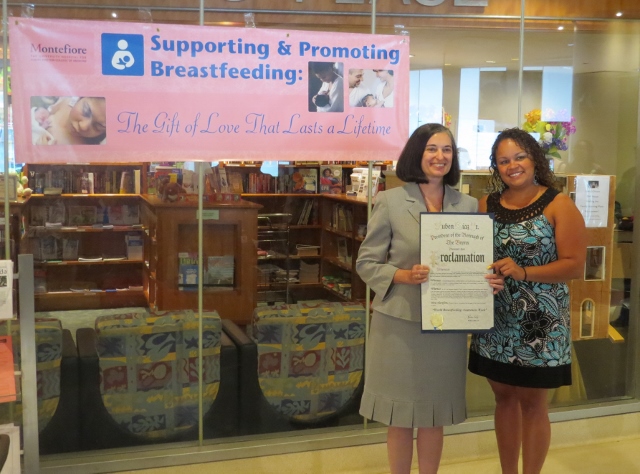
Photo by Jasmine Gomez
By JASMINE GOMEZ
A mother’s breast milk can provide her newborn with the necessary vitamins, proteins, fat, and antibodies to sustain a baby’s healthy growth.
As part of its committed support to promote breastfeeding among Bronx moms, the Children’s Hospital at Montefiore (CHAM) received a citation for those efforts as part of World Breastfeeding Week.
At the celebration, Judy Aschner, physician-in-chief at CHAM and Michael I. Cohen, University Chair of Pediatrics at Albert Einstein College of Medicine, along with physicians and staff received a proclamation from the Bronx Borough President’s office for educating moms on the benefits of breastfeeding.
The celebration included giveaways such as informational pamphlets about breastfeeding and baby tees that included a tongue-in-cheek message: “I eat at Mommy’s.”
“Breastfeeding continues to be very important in our community and that we know that there are many benefits to breastfeeding, both to the baby and to the mother, some of which include decreased risk of ear infections, respiratory tract infections, less visits to their pediatrician and to the emergency room,” said Dr. Talitha Bruney, an OB/GYN at CHAM.

Photo by Jasmine Gomez
Bruney also dispelled some popular myths about breastfeeding, especially one in which mothers who are sick pass their illness to their newborn during breastfeeding. The practice, on the contrary, actually transfers antibodies that protect the baby from any impending infections, explained Dr. Bruney.
Most illnesses cannot be transferred through breastfeeding, with one exception being HIV. If a mother does not know or is worried about transferring an illness through breastfeeding, she can consult with her doctor.
Of two common methods mothers feed their child–breastfeeding or baby formula–the former is the preferred method, according to Dr. Bruney.
“We’re really trying to reach out to the community and have them understand that it should be a choice,” said Dr. Bruney. “It should be the first option and only supplement with formula, if necessary.”
In recent years, breastfeeding has dominated parenting magazines and blogs after a controversial Time Magazine cover was published in 2012, featuring a mother breastfeeding her 3-year-old son. This opened the debate on what is the appropriate age for a child to stop breastfeeding.
“If the mother is comfortable doing it, and the child is still comfortable taking her breast, we do not really give a time period as to when to stop,” said Dr. Abie Iyare, a pediatrician at CHAM. “What we do encourage is, if possible, exclusive breastfeeding for the first six months of life. And we usually say we encourage breastfeeding until the child is at least one year of age.”




